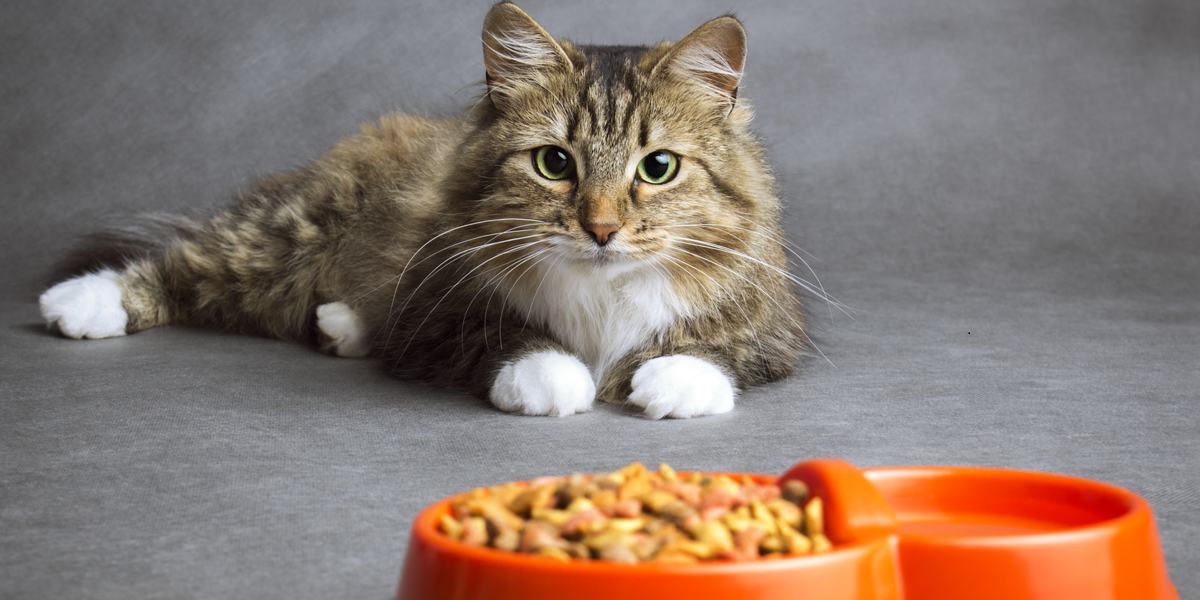
Fish is an incredibly common ingredient in cat food but is it really what cats want? Experts suggest that fish is not a natural part of a feline diet – your cat’s ancestors were largely desert felines that subsisted on rodents, birds, and other small animals.
Though fish may not have been part of your cat’s ancestral diet, it’s an excellent source of animal-based protein and omega-3 fatty acids. The trouble is some cats are sensitive or allergic to fish.
Fortunately, pet food manufacturers have grown aware of the potential for food allergies in cats and many have made efforts to include single-protein and novel protein recipes in their product lineup.
We’ve assembled a list of fish-free cat foods to help you find the right option for your fussy feline.
At a Glance: Best Fish-Free Cat Food to Buy
Want a quick look at the cat foods reviewed in this article? In the comparison table below, we’ve highlighted some of the most important features of each product. You’ll find more detailed information about each product later in the article.
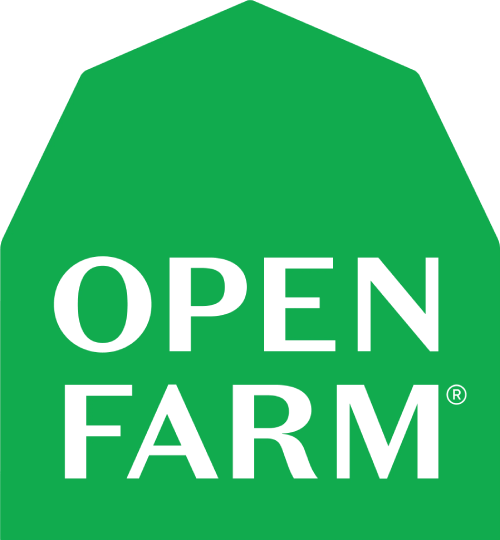
Open Farm Harvest Chicken Rustic Blend
- Protein sources are the food’s primary ingredients
- Made from responsibly-humanely raised chicken
- Free of potentially-harmful artificial colors, flavors, and preservatives
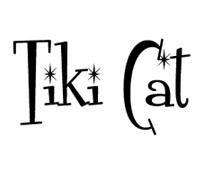
Tiki Cat Puka Puka Luau Succulent Chicken in Chicken Consomme Grain-Free Canned Cat Food
- Packed with species-appropriate animal protein
- Completely free from carbohydrates
- Rich in moisture to support your cat’s hydration
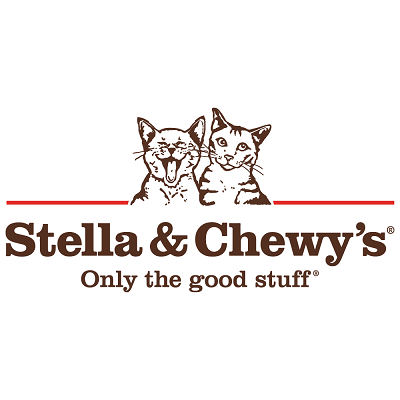
Stella & Chewy’s Freeze-Dried Raw Absolutely Rabbit Dinner Morsels Cat Food
- Made from a single source of novel animal protein
- Supplemented with probiotics for digestive support
- Free from artificial colors, flavors, and preservatives

Kirkland Signature Chicken and Rice Dry Cat Food
- Two sources of animal protein as top two ingredients
- Chicken fat provides a nutritious source of essential fats
- Affordably priced and sold in large 25-pound bags
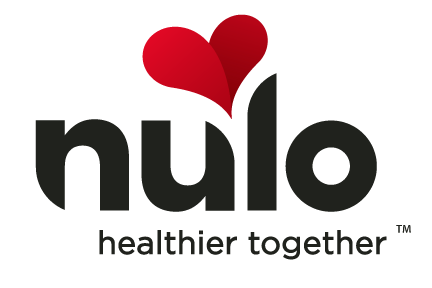
Nulo Freestyle Minced Turkey & Duck in Gravy Canned Cat & Kitten Food
- Made with two novel sources of animal protein
- Rich in moisture to support hydration
- Formulated for both adult cats and kittens
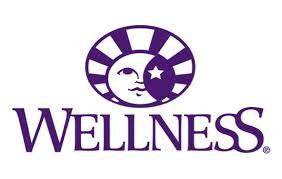
Wellness CORE Signature Selects Shredded Boneless Chicken & Chicken Liver Entrée in Sauce
- Made with a single source of animal protein
- Rich in moisture to support hydration
- Free from artificial additives and plant proteins
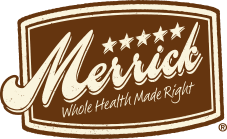
Merrick Limited Ingredient Diet Grain-Free Real Duck Pate Canned Food
- Very short list of main ingredients
- Deboned duck as a single source of animal protein
- Completely free from artificial additives
Is Fish Dangerous for Cats?
By now you’re probably aware of the fact that cats are obligate carnivores. Without going into too much detail, this simply means their bodies have a biological requirement for a meat-based diet.
Wild cats subsist primarily on small prey like rodents, birds, and reptiles. Big cats, of course, will take down larger prey like deer. Certain species of cats that live near water may also eat fish and other aquatic prey like frogs and crayfish.
As an animal-based source of protein, fish is not inherently dangerous for cats. It simply isn’t a major component of their ancestral diet.
Fish is a complete source of protein, providing your cat with all the essential amino acids he needs as well as healthy fats. It is a particularly rich source of omega-3 fatty acids which support your cat’s skin and coat health as well as healthy joints and a strong immune system.
While fish is perfectly safe for most cats, the potential for fish allergies cannot be ignored.
According to Hill’s Pet Nutrition, food allergies in cats are uncommon. When they do occur, however, they’re most likely to be triggered by common proteins like chicken, fish, beef, and dairy.
Symptoms of Fish Allergy in Cats
A food allergy is an abnormal immune-mediated reaction to an antigen found in specific foods. In other words, the immune system reacts negatively to a certain protein in the food. It is unknown exactly why food allergies occur or why some cats develop them and others don’t.
In order for a cat to develop an allergy, they have to be exposed to the food. For example, a cat can’t develop an allergy to fish if they’ve never eaten fish. Food allergies can develop at any age or time, even if the cat has been eating the food with no issues for months or years.
Common symptoms of food allergies in cats include:
- Chronic skin inflammation
- Itchy skin
- Overgrooming
- Lesions on the skin
- Hair loss
- Recurrent ear infections
- Digestive upset
While some cats develop gastrointestinal symptoms like vomiting or diarrhea, chronic skin problems are a more common indicator of food allergy.
The best way to diagnose a food allergy is to work with your veterinarian and complete a food trial. Your vet may recommend testing to rule out other potential causes for your cat’s symptoms, but a food trial is generally required to confirm an allergy.
This simply involves changing your cat’s diet for a period of 6 to 8 weeks to see whether symptoms of the allergy resolve.
You’ll need to choose a diet that contains a protein source to which your cat hasn’t previously been exposed. If you’ve been feeding your cat a fish recipe, try a beef or chicken recipe instead. Foods made with novel proteins like venison and lamb are also a good choice for food trials.
If your cat’s symptoms resolve during the food trial, the final test is to reintroduce the old food for a few days. Should your cat’s symptoms return, you can safely assume something in the food is the problem.
Tips for Choosing Fish-Free Cat Food
Once you’ve determined that your cat is allergic or sensitive to fish, it’s imperative that you remove fish from your cat’s diet. More than simply choosing a recipe that doesn’t include fish, however, you should make sure the new formula is species-appropriate and made from high-quality ingredients.
Here are a few things to look for in a fish-free cat food:
1. It Should Contain Plenty of Animal Protein.
Even if your cat can’t tolerate fish, he still needs animal-based protein. Try chicken, turkey, or beef as a starting point. Avoid recipes that rely too heavily on plant-based proteins like pea protein or potato protein. Cats simply aren’t able to effectively digest or utilize carbohydrates as effectively as animal ingredients.
It’s generally best to stick with a single protein formula, just in case your cat develops an allergy to the new protein. It will be easier to identify the problem quickly and make the necessary switch instead of having to experiment with multiple different proteins.
2. It Should Not Contain Any Fish Ingredients.
Before settling on a new cat food, double check the list of ingredients. Just because the name of the recipe doesn’t include fish doesn’t necessarily mean the product is fish-free. Many pet food manufacturers use multiple protein sources in their formulas to meet protein recommendations.
Check the ingredients list for fresh fish like salmon and tuna as well as concentrated fish ingredients like fish meal. Fish-based fats like fish oil are unlikely to trigger fish allergies in cats but there’s no harm in avoiding them anyway, just to be safe.
3. It Should Contain a Limited List of Ingredients.
If your cat is allergic to fish, he may be sensitive to other ingredients as well. Limited ingredient diets (LIDs) are often easier for cats with sensitive digestion to tolerate. They’re also a great option for conducting food trials.
When choosing a limited ingredient cat food, be sure to avoid vaguely named ingredients that could contain a mixture of different proteins. Poultry meal, for example, could contain both chicken and turkey. You may want to avoid animal by-products as well and opt for a single source of protein.
4. It Should Be Free From Artificial Additives and Low-Value Plant Foods.
Artificial colors, flavors, and preservatives have no place in a high-quality diet for cats. Not only do these ingredients have no nutritional value to speak of, but they come with a risk of negative health effects.
Carbohydrates should not be a staple in your cat’s diet, but it’s particularly important to avoid plant ingredients that provide little nutritional value. Fillers like corn, wheat, and soy products should be avoided at all costs and the total carbohydrate content of your cat’s food should be well below 20%. We prefer recipes that contain 10% carbs or less.
5. It Should Deliver Species-Appropriate Nutrition.
Your cat’s nutrition should be every cat owner’s top priority. Keeping in mind your cat’s status as an obligate carnivore, choose a recipe that is formulated around animal-based ingredients with few to no carbohydrate ingredients. Make sure the recipe you choose is appropriate for his life stage as well.
Now that you have a better understanding of why you might consider a fish-free food for your cat and what to look for, let’s take a look at our top picks for the best cat food for cats with fish allergies.
The Top 7 Best Fish-Free Cat Foods
Frequently Asked Questions
Is fish oil safe for cats with fish allergies?
Food allergies in cats are generally triggered by the proteins in the offending ingredient. According to the Feline Nutrition Foundation, you might be able to safely give your cat food that contains fish oil as long as it is completely free from fish protein. It may still be wise to get your veterinarian’s approval before you do.
Can cats with fish allergies eat shrimp?
A fish allergy doesn’t necessarily translate into an allergy to shellfish like shrimp. In the same vein, just because your cat is allergic to shrimp, he isn’t guaranteed to be allergic to fish or other types of seafood. If your cat is allergic to fish, however, it’s best to introduce new proteins one at a time and watch for the onset of symptoms which might indicate a second allergy.
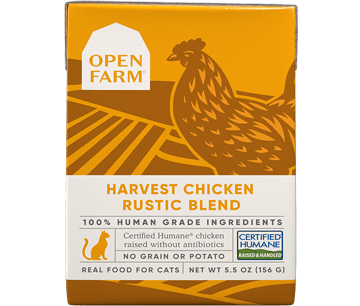
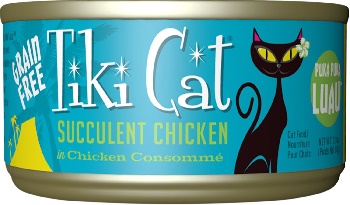
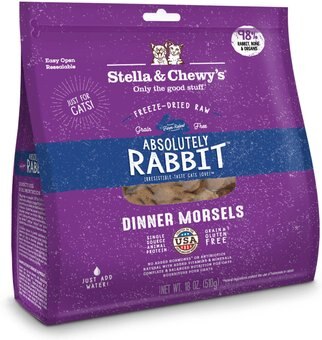
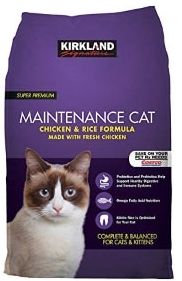
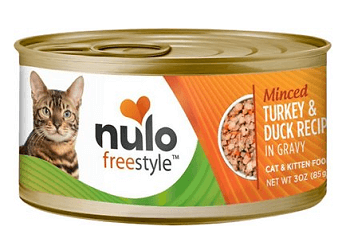
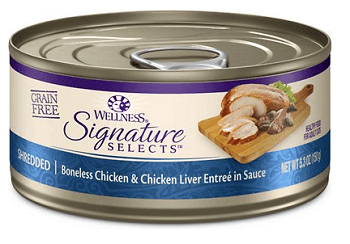
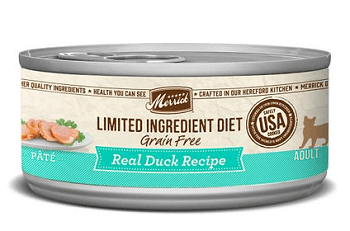
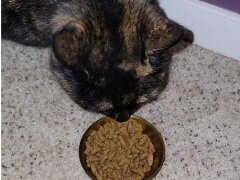

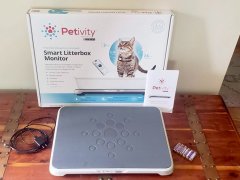
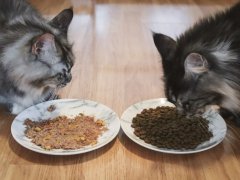
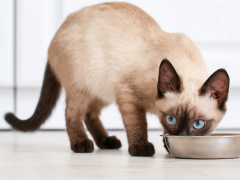
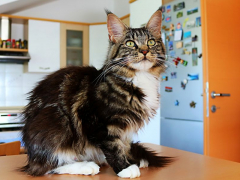
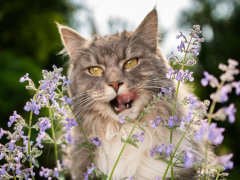
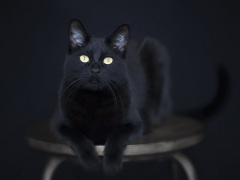
The Costco Kirkland brand dry cat food listed in article, DOES HAVE salmon oil listed in ingredients, unfortunately! I to Costco to purchase a bag and was very disappointed to see this!
Hello Connie, thanks for mentioning that. On the Kirkland site, the food is still listed without any salmon oil, so I’m not sure what to say. It seems like perhaps the formulation was updated, and that is reflected on the bags but not online. Reaching out to support to find out if this is something we need to update. Thank you again!
We rely on the Costo Kirkland brand for our dry food and had no problems with it. (We do offer wet food to our cats as well.) We bought a bag last week. It gave one of our cats (who has severe fish allergies) diarrhea and a lot of pain. When we checked the label it had salmon oil listed, which was not on the old bag. This was in Canada, so this change is possibly not yet in the States. When we checked the ingredient list it said the salmon oil was there to add DHA.
I see. Thank you for sharing this—I’ve been trying to figure out what’s going on with Kirkland’s dry cat food and fish oil for a while. Hope your cat is feeling better now.
The article about fish not being the best food for cats is very informative. My cat really likes it BUT I’ve always been concerned and have on many occasions tried to find out if it really is very healthy for cats, not because of food allergies, but because tuna and some other fish contain mercury. I haven’t yet seen this addressed concerning pet ( primarily cat) food. A very large number of cat foods contain tuna, tuna oil- tuna contains mercury. And as do other other ocean fish. Why have pet food companies not addressed this? I’ve often asked ‘is mercury also a risk for cats, as it is for humans’- and the answer, of course, is yes! So why do pet food producers continue to promote ingredients potentially harmful for our beloved cats?
The article which I just read, cleared up a lot about fish and cats. My cat refuses to eat any kind of fish, including shell fish (crab or shrimp). It’s been a tough battle finding something he will eat. So far it is just chicken. I have always thought that any animal should not have anything with Mercury in it. Thanks for clearing that up.
Smalls just recently reformulated to add cod liver oil to all of their recipes. Awful news, because otherwise their food was great.
I just now read that as well!
Why do these companies keep sneaking in fish as if it’s a neutral ingredient? So frustrating!
My cat always loved the fish-based cat foods, but at age 12 he became hyper-thyroid. Though he takes medication to control it, I find that the fish-based cat foods aggravate his condition. I think there’s too much iodine in the seafood-based cat foods for a hyper-thyroid cat, so started buying only chicken, turkey, beef, duck etc. He was up and down with those until I looked at the ingredients, and some of them still contain fish. Now that he’s not getting any seafood at all he’s doing great and finally putting on some weight.
Thank you for sharing your success story! Great insights.